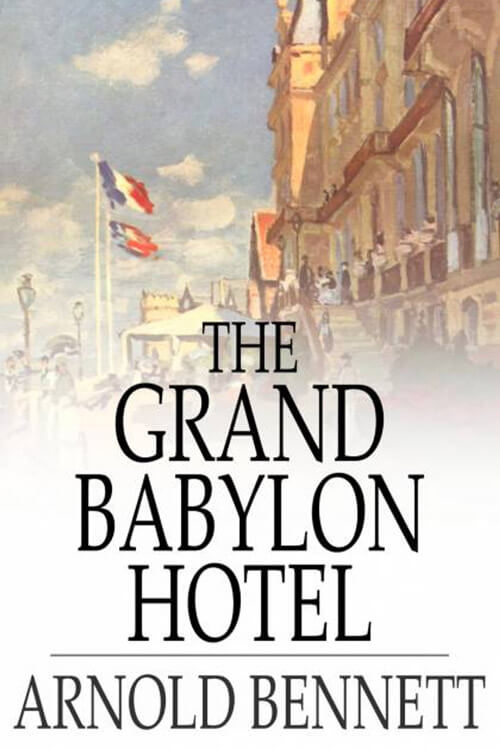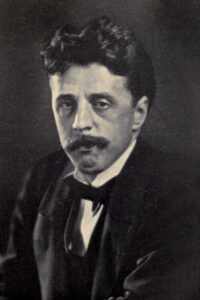
The Grand Babylon Hotel
A few minutes later, while the alert, middle-aged man was tasting the Angel Kiss, Jules sat in conclave with Miss Spencer, who had charge of the bureau of the Grand Babylon. This bureau was a reasonably large chamber with two sliding glass partitions that overlooked the entrance hall and the smoking room. Only a tiny portion of the clerical work of the grand hotel was performed there. The place served chiefly as the lair of Miss Spencer, who was as well known and as crucial as Jules himself. Most modern hotels have a male clerk to superintend the bureau. But the Grand Babylon went its own way. Miss Spencer had been a bureau clerk almost since the Grand Babylon first raised its massive chimneys to heaven, and she remained in her place despite the vagaries of other hotels. Always admirably dressed in plain black silk, with a small diamond brooch, immaculate wristbands, and frizzed yellow hair, she looked now just as she had looked an indefinite number of years ago. Her age—none knew it, save herself and perhaps one other, and none cared. Her figure’s gracious and alluring contours were impeccable, and in the evenings, she was a valuable ornament of which any hotel might be innocently proud. Her knowledge of Bradshaw, steamship services, and the programs of theatres and music halls was unrivalled, yet she never travelled; she never went to a theatre or a music hall. She seemed to spend the whole of her life in that official lair of hers, imparting information to guests, telephoning the various departments, or engaging in intimate conversations with her special friends on the staff, as of now.
‘Who’s Number 107?’ Jules asked this black-robed lady.
Miss Spencer examined her ledgers.
‘Mr Theodore Racksole, New York.’
‘I thought he must be a New Yorker,’ said Jules, after a brief, significant pause, ‘but he talks as good English as you or me. He says he wants an “Angel Kiss”—maraschino and cream, if you please—every night. I’ll see he doesn’t stop here too long.’
Miss Spencer smiled grimly in response. The notion of referring to Theodore Racksole as a ‘New Yorker’ appealed to her sense of humour, a sense in which she was not entirely deficient. She knew, of course, that Jules knew that this Theodore Racksole must be the unique and only Theodore Racksole, the third richest man in the United States and probably in the world. Nevertheless, she ranged herself at once on the side of Jules.
Read or download Book
Arnold Bennett
Enoch Arnold Bennett (27 May 1867 – 27 March 1931) was an English author, best known as a novelist who wrote prolifically.
Biography.
Between the 1890s and the 1930s, he completed 34 novels, seven volumes of short stories, 13 plays (some in collaboration with other writers), and a daily journal totalling more than a million words. He wrote articles and stories for more than 100 newspapers and periodicals, worked in and briefly ran the Ministry of Information in the First World War, and wrote for the cinema in the 1920s. Sales of his books were substantial, and he was the most financially successful British author of his day.
Born into a modest but upwardly mobile family in Hanley, in the Staffordshire Potteries, Bennett was intended by his father, a solicitor, to follow him into the legal profession. Bennett worked for his father before moving to another law firm in London as a clerk aged 21. He became an assistant editor and then a women’s magazine editor before becoming a full-time author in 1900. Always a devotee of French culture in general and French literature in particular, he moved to Paris in 1903; the relaxed milieu helped him overcome his intense shyness, particularly with women. He spent ten years in France, marrying a Frenchwoman in 1907. In 1912, he moved back to England. He and his wife separated in 1921 and spent the last years of his life with a new partner, an English actress. He died in 1931 of typhoid fever, having unwisely drunk tap water in France.
Many of Bennett’s novels and short stories are set in a fictionalized version of the Staffordshire Potteries, which he called The Five Towns. He firmly believed that literature should be accessible to ordinary people and lamented literary cliques and élites. His books appealed to a broad public and sold in large numbers. For this reason and his adherence to realism, writers and supporters of the modernist school, notably Virginia Woolf, belittled him, and his fiction became neglected after his death. During his lifetime, his journalistic “self-help” books sold in substantial numbers, and he was also a playwright; he did less well in the theatre than with novels but achieved two considerable successes with Milestones (1912) and The Great Adventure (1913).
Studies by Margaret Drabble (1974), John Carey (1992), and others have led to a re-evaluation of Bennett’s work. His finest novels, including Anna of the Five Towns (1902), The Old Wives’ Tale (1908), Clayhanger (1910), and Riceyman Steps (1923), are now widely recognized as significant works.






